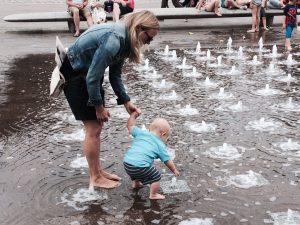
Real Life Stories of Postpartum Depression
Several weeks ago I was speaking to my very good friend Julia, who agreed to be interviewed about her postnatal experience. We’ve known each other a long time and her experience, along with that of my clients and other friends over the years, demonstrate that it is very common, but not commonly spoken about.
Do you know someone who has suffered with postpartum depression? Have you suffered from it yourself? A few weeks ago I spoke to Mum’s the Word Podcast, where Kaz Jaffe interviewed me on More Than Just the Blues, about how I got into working in mental health and how important it is to open the discussion and normalise it.
I hope Julia’s story touches you and you can find something useful in her experience.
*Note postpartum depression (PPD) and postnatal depression (PND) are used interchangeably in this interview, but are the same thing.
Julia’s Interview
Q: You gave birth to your son Josh just over a year ago, how are things going with him?
A: That’s right, Josh was born July 2016 and is now nearly 16 months old. Things are going really well. Josh goes to nursery 4 days a week while I’m at work and then we have Fridays together and weekends as a family.
Workday mornings are a bit of a frantic rush, like most families, but we manage to all get out the door and drop him at nursery at 8am. I am lucky that I work flexible hours. I can pick him up at 5pm, so I have some time with him in the evenings, which I love. We get home, have something to small to eat together, spend some time playing, then it’s bath and bedtime by 7pm. He’s so stimulated at nursery he’s normally exhausted and goes straight to sleep, at which point I make dinner for my husband and I and usually get myself to bed by 9.30pm, as sleep is still my number one priority!
Fridays and weekends are fun, we go swimming or to a music group, see friends, go for walks in the woods or the park and enjoy family meals out. We tend to go away and visit friends and family a lot as we don’t have room for visitors on our flat. When we are at home, we enjoy Josh’s afternoon nap time to have some time together or catch up on chores and cooking!
Q: Shortly to after giving birth you suffered with more than just the post baby blues; tell us a little bit about that time.
A: I think by the time I realised that it wasn’t just baby blues, it was probably a few weeks in. I was still crying an awful lot most days and on several occasions wanted to run away and hide from it all. I remember saying to my husband on more than one occasion “You’ve got to take him, I’m not fit to be his mother”.
My husband would leave for work and it would take all my strength to not wave him off crying or cry as soon as he had left. One of my lowest points was crying in Josh’s nursery pulling at my hair thinking to myself “What have I done to my life?!”. I was desperately sad and guilty that this was my reaction to motherhood. I did also, sadly, suffer from hallucinations of Josh being harmed, which I still find hard to talk about. All those things combined, plus an extreme lack of sleep, made me reach out for help.
Q: At that point, what did you know about postpartum depression?
A: I thought I knew about PND. I had studied nutrition, been on an NCT course and suffered with mild depression and anxiety previously, but I was not as well equipped as I thought. Unfortunately the NCT class didn’t cover much other than the baby blues and the other extreme of postpartum psychosis. There was a distinct lack of information about the full spectrum of PND and the full range of ways it can manifest for different people.
I don’t remember anyone talking to me openly about PND before I had Josh. I also don’t remember any of my friends or sisters discussing anything about how they felt after giving birth – other than positive. Maybe I was naïve or didn’t ask, but it certainly seems to be a taboo subject. I know that since I’ve been open about my experience with friends and family, more people have opened up about their own similar experiences.
Q: Aside from worrying about Josh, how did you feel about your condition?
A: I felt…isolated and confused, but guilty most of all. I didn’t really ever use the term PND as I don’t think labels are helpful. I did know I needed help and was determined to recover, for the sake of my son and my marriage. On some level, I accepted that it was an illness and that it was not my fault. At the same time, the very nature of the illness is to blame yourself for everything, tell yourself that you are a terrible mother and your child deserves better. It’s like I was on self-destruct mode.
Q: What kind of support did you receive?
A: I am incredibly lucky to have the most patient, kind and understanding husband. He is my rock, and was throughout the dark days last winter. Supporting me however he could, he would regularly come home early from work or take a day off.
My husband
He had no expectations from me regarding the housework and would always try to make life as easy as possible. He would surprise me with flowers out the blue, bring me a cup of tea in bed, run me a bath or let me go for a run on my own. The really big thing that made a difference was our morning routine. Each morning my husband would take Josh through to the living room and play with him. That gave me time to do some yoga and meditation and then have a shower by myself.
“Those 30 mins each morning set me up for the day, and for months I followed that routine, even at weekends. Even if I’d had hardly any sleep I would do it as it just made me feel able to cope with the day.”
My mum was also amazing.
At the very beginning she stayed with us, off and on, for almost 5 weeks. I didn’t want to be alone with Josh for the first month, so between my mum and husband I wasn’t, and that made a huge difference.
My NCT circle of friends
Seeing one or more of them almost everyday helped give me structure to the day as well as connecting to people who were going through exactly the same thing as I was.
My three sisters were a massive support
Even though they don’t live close, FaceTime and WhatsApp became my saviour again for connection. Motherhood can be a very lonely time, so staying connected was vital for me. I also stayed in touch with my friends who lived further away as much as I could and saw those that were nearer when we could.
6. Did you feel supported by your healthcare provider?
A: Yes, again I was very lucky. I was referred by my health visitor to an Infant and Parent psychologist, whom I saw regularly when Josh was 6 weeks to 8 months old. It was just so great to have someone to talk to at a set time each week. I tried to save up all my questions and worries for that meeting, telling myself that I could wait a week. Although, this didn’t stop me regularly taking Josh to the doctors out of concern and anxiety for his health and wellbeing. I still worry about him now, but try to tell myself to watch and wait a bit more than rush straight to the doctors.
Q: How did your work respond? Were they supportive?
A: I didn’t feel the need to tell work while I was on maternity leave, but since returning, I have been open about my experience and been surprised at how supportive everyone has been.
Q: Before you had Josh, did you have a normal pregnancy?
A: Yes, my pregnancy was all normal and I really enjoyed being pregnant – after the nausea had subsided! I was so excited to meet Josh and felt a huge amount of love for him, before he even arrived.
Q: How did your labour go, was there anything particularly stressful about it?
A: My labour was really quick! I had a natural birth and was only in labour for 6 hours. He was delivered very quickly, once my waters were broken. He came out bright red, which took a few days to die down and some of the midwives said he may have been a little in shock at the speed of delivery. I know I was! The birth itself wasn’t particularly stressful, other than the speed. One minute I had a huge bump and then, all of a sudden, I was holding my baby boy!
Q: Is there anything that you feel may have contributed to your experiencing PPD/PND?
A: I think my history of anxiety and my personality type were definitely contributing factors. However, I think the sleep deprivation was the main cause for me. For almost 6 months I survived on 3-5 broken hours of sleep a night. We are all individuals and I found that I couldn’t function on that amount of sleep where I know others who have no issue. The lack of sleep heightened my anxiety which was also triggered by josh being tongue tied which meant he found it hard to feed initially. I think all these things plus my complete lack of awareness what being a new mum actually entailed and grieving for my past freedom contributed.
Q: You recently returned to work; tell us how that’s been for you.
A: It’s been up and down to be honest. I have been back 3 months and did a phased return using holiday I had left over. The team and my manager have been amazingly supportive, but Josh took a while to settle into nursery and that was hard. Just getting back into using my brain in a different way has been tricky. Also with nursery care, comes bugs from the other kids, so I feel like one of us is always unwell in the family. When it’s Josh, I worry a lot, so my anxiety is never far away. Some days it’s easier than others and when I manage to fit some exercise in that helps too. Being a working mum isn’t easy!
Julia’s Advice
Q: What advice would give to women that are pregnant or that might be suffering with postpartum depression?
Get Information
- Arm yourself with knowledge of what PPD/PND is and what the symptoms are so you know what to look out for and when to ask for help. Try not to blame yourself or feel shame.
- Throw out the baby books! My biggest mistake was torturing myself with the shoulds and musts and routines in all the baby books. Eventually you will find something that works for you but don’t force it. It’ll fall into place when you and your baby are ready.
Ask for Help
- Get the help you need earlier rather than later. Stay connected with friends family, even through technology if necessary.
- Make the most of local baby groups, but don’t put pressure on yourself to go if you don’t want to. Only do what feels comfortable for you. You don’t need any extra pressure when pregnant or as a new mum.
Look After Your Body & Mind
- Eat well…one thing I did manage to do was keep eating well. You need 500 extra calories a day when breastfeeding, from healthy sources such as good fats and whole grains and protein. Joyce wrote about this in more detail here.
- Exercise outdoors – walking was my saviour with Josh. Everything is better once you’re out the door. I made sure I went for at least 1-2 walks a day (it helps you and the baby sleep!)
- Rest is as good as sleeping – people used to tell me to sleep when the baby sleeps, which I hated it. My anxiety meant I just couldn’t sleep. So instead of sleeping, just lie on your bed or read. Just rest. It’s as rejuvenating as sleep can be sometimes.
- Yoga or meditation or something similar…just breathe! It’s amazing!
- Avoid the caffeine and cake addiction most new mums have. It plays havoc with blood sugar and mood.
- Make time for yourself – even if it’s 30 mins a day; a walk or a bath… and make it a priority
- Make time for your partner if you have one as it’s such an important relationship to nurture
- I did baby massage with Josh and it really helped me to bond with him.
 Joyce’s comments: Julia (pictured here) is a loving mum and juggles a career, like many of you. She knew a lot from studying nutrition, but still felt underprepared for the new experience. Reaching out to those around you, who love you, is the best thing you can do. Next to that, it’s so important to keep eating well. So ask those who love you to read this post on Postpartum Depression and skip to the image that tells you what foods to prepare to keep you going.
Joyce’s comments: Julia (pictured here) is a loving mum and juggles a career, like many of you. She knew a lot from studying nutrition, but still felt underprepared for the new experience. Reaching out to those around you, who love you, is the best thing you can do. Next to that, it’s so important to keep eating well. So ask those who love you to read this post on Postpartum Depression and skip to the image that tells you what foods to prepare to keep you going.
Did you find this helpful? Give it a like and share it with someone you know that might benefit using the buttons below.




Comment
[…] You can also get a lighter version on the podcast ‘Mums’s the Word’. Read this Real Life interview with a mum who shares her experience of postpartum […]